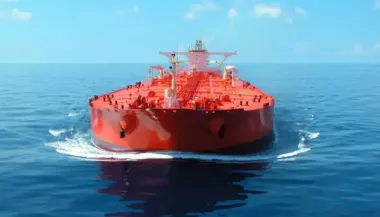How Russia easily circumvents Western oil sanctions — analyst's opinion

Russia continues to circumvent Western oil sanctions
Europe still does not dare to impose serious sanctions against Russian oil. And the situation with the seizure of the Russian shadow fleet tanker Boracay by French special forces resembled theater, because after a loud delay, the tanker continued on its way and this did not lead to restrictions on oil sales.
Columnist Owen Matthews wrote about this in a column for the British weekly The Spectator.
He added that French President Emmanuel Macron could not confirm the existence of evidence that this particular vessel was involved in the drone attacks in Europe and the launch of the UAVs spotted in Denmark.
He said it was a step towards a policy of preventing suspicious tankers involved in the trade of Russian oil from entering the country's territorial waters. The aim was to "increase pressure on Russia to convince it to return to the negotiating table" regarding Ukraine.
The columnist added that the high-profile international incident will end with only a two-day delay of a shipment of 100,000 tons of Russian crude oil from the Baltic port of Primorsk to India, where it is to be shipped to the port of Vadinar, Gujarat, and sent to the refinery of the Indian company Nayara Energy.
He writes that the world cannot prohibit the Russians from using the shadow fleet — these tankers travel the seas quite legally, but due to their age and technical condition, they are not insured and cannot enter most European and American ports.
Europe can do little to stop this movement, and what's more, it is itself a major consumer of Russian oil, petroleum products, and gas. And Russia's largest private oil company, Lukoil, still operates refineries in the Netherlands, Romania, and Bulgaria that fully comply with sanctions requirements.
He reminded that the purchase and sale of Russian oil is not prohibited. However, there is a price limit. Although in practice it turned out that Russia quite easily circumvents the established restrictions.
Matthews writes that one method is so-called “certification fraud,” where official documents state a low price for a shipment but add hidden additional costs, such as processing and transportation, to make up the difference. Another method is for Russian oil giants to set up intermediary subsidiaries that buy oil cheaply and resell it at market prices.
When it comes to ending Russian oil exports, we see a lot of rhetoric and almost no real action. This is because Europe remains a major consumer of Russian oil and gas due to its commitments to zero emissions and the fight against nuclear energy.
It is not just Russophile Hungary and Slovakia that are to blame, as Brussels pretends. A large amount of Russian gas supplied by pipeline still flows through Ukraine and Turkey, and imports of Russian liquefied natural gas into Europe actually increased by 25 percent last year.
In addition, Europe imports millions of tons of diesel and gasoline, produced from Russian crude oil in India. European energy consumers remain among the largest backers of Putin’s war machine.










